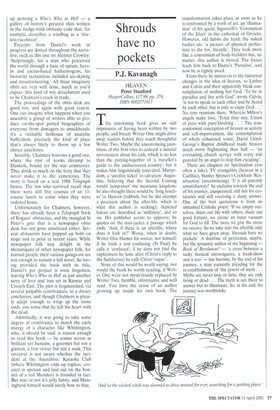Shrouds have no pockets
P.J. Kavanagh
HEAVEN Peter Stanford HarperCollins, £1799, pp, 374, ISBN 0002571013 This interesting book gives an odd impression of having been written by two people, and breezy Writer One might drive away readers before they reach thoughtful Writer Two. Maybe the unconvincing jauntiness of the first tries to conceal a natural nervousness about his task, which is no less than the putting-together of 'a traveller's guide to the undiscovered country', but it makes him linguistically tone-deaf. Martyrdom, a 'surefire ticket' to salvation: Augustine, believing that the Second Coming would 'jump-start' the messianic kingdom; he also thought there would be 'long lunches' in Heaven (rubbish, but he did attempt a precision about the after-life, which is what this author is seeking); depicted haloes are described as 'millinery', and so on. His publisher seems to approve; he quotes on the dust-jacket a passage which ends, 'And, if there is an afterlife, where does it kick in?' Worse, when in doubt, Writer One blames his source, not himself: if he finds a text confusing (St Paul) he calls it 'confused'; if he does not find the explicitness he lusts after (Christ's reply to the Sadducees) he calls Christ 'vague'.
None of this would be worth saying, nor would the book be worth reading, if Writer One were not mysteriously replaced by Writer Two, humble, informative and well read. You have the sense of an author growing up inside his own book. The transformation takes place as soon as he is confronted by a work of art, an 'illustration' of his quest; SignoreIli's 'Coronation of the Elect' in the cathedral of Orvieto. However, old habits die hard: the naked bodies are 'a picture of physical perfection to die for, literally'. They look more like a convention of body-builders but, no matter, this author is moved. The fresco leads him back to Dante's `Paradiso', and now he is rightly awed.
From there he moves on to the historical changes in the idea of heaven, to Luther and Calvin and their apparently bleak contemplation of nothing but God. `To be in paradise and live with God', wrote Calvin, 'is not to speak to each other and be heard by each other, but is only to enjoy God ...' No cosy reunions there. Whereas Milton's angels make love, 'Total they mix, Union of pure with pure/Desiring . . .' The nonconformist conception of heaven as activity and self-improvement, the contemplation of which exhausted some; David LloydGeorge's Baptist childhood made heaven much more frightening than hell — 'an everlasting church service with every exit guarded by an angel to stop him escaping'.
There are chapters on Spiritualism (too often a fake), TV evangelists (heaven in a Cadillac), Stanley Spencer's Cookham 'Resurrection' (unconvincing). 'It is all patently unsatisfactory!' he exclaims towards the end of his journey, exasperated, still hot for certainties and still receiving a dusty answer. One of the best quotations is from an unnamed Catholic priest: 'If we empty ourselves, share our life with others, share our good fortune, we create an inner vacuum for God to fill. The more we give the more we receive. So we take into the afterlife only what we have given away. Shrouds have no pockets.' A doctrine of perfection, maybe, but the sprauncy author of the beginning — Book of Revelation? — 'a cross between a tacky musical extravaganza, a freak-show and a zoo' — has become, by the end of his journey, a man earnestly pleading for the re-establishment of 'the power of myth . Myths are never true or false, they are only living or dead . . . The myth is not there to answer but to illuminate. So, in the end, his journey was worthwhile.


















































































 Previous page
Previous page